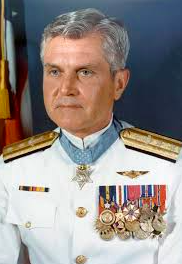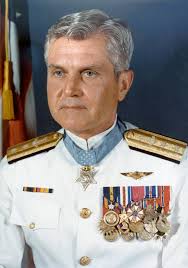The Stockdale Paradox Applied to Coaching

In Jim Collins’ book Good to Great he outlines something vital to success: possessing unwavering faith that you will in fact prevail in the end, combined with the discipline to confront your current reality no matter how brutal it may be. This is known as ‘The Stockdale Paradox.’
The name comes from Admiral Jim Stockdale. He was the highest ranking United States military officer in a prisoner-of-war camp during the midst of the Vietnam War. He was tortured dozens of times while being imprisoned for eight years.
In his book, Jim Collins recounts reading Stockdale’s account of his eight years as a prisoner of war. Collins found himself getting extremely depressed and wondered how on earth Stockdale, who lived it, was able to persevere through a hell most of us can’t even comprehend. When he later was able to pose this very question to him, the Admiral responded with the following, “I never doubted not only that I would get out, but also that I would prevail in the end and turn the experience into the defining event of my life, which in retrospect, I would not trade.”
As their conversation continued, Collins asked who didn’t make it out?
Stockdale replied. “That’s easy. The optimists. They would say ‘we’ll be out by Christmas.’ Christmas would come and go and they’d say ‘by Easter.’ And eventually they died of a broken heart.”
As their conversation continued, Stockdale ended with the following, “This is a very important lesson. You must never confuse faith that you will prevail in the end – which you can never afford to lose – with the discipline to confront the most brutal facts of your current reality, whatever they might be.”

How can we relate these lessons to how we coach our athletes? My job as a coach is to educate and empower my athletes so they can become self-reliant. I want to empower my athletes to set massive, lofty goals; to dream big – all the while setting a standard of self-discipline and work ethic that matches those aspirations. In short, they need to simultaneously become their own biggest believer and harshest critic.
They need to have a grand vision of the future and a belief that they will prevail in the end, no matter the adversity they face, to one day transform their previously set goals into reality. However, this next part is most important: their belief is so strong because at its foundation is the knowledge that they will constantly confront their present situation, both objectively and harshly. They’ll have no problem with pointing the finger at the person staring back in the mirror, telling themselves they need to be better, they need to work harder, and smarter.
Going back to Good to Great, Collins talks about how all companies pursue a vision of greatness. But, what separates the great ones are those who continually refine the path to greatness with the brutal facts of reality.
Building on this point, Ray Dalio, in his book Principles, talks about the importance of being a hyperrealist. He states that people who achieve greatness aren’t idle dreamers; they’re totally grounded in reality. He then proposes the following formula for success:
Dreams + Reality + Determination = A Successful Life
As coaches who work with young impressionable athletes, one of our greatest responsibilities is to empower them to dream big. Equally important is educating them to be hyperrealists with their current reality and how hard they are working.
Too often people are realistic with their goals because they simply aren’t able to be truly honest with themselves on a daily basis. I will always try to help my athletes instil a belief that they can achieve anything they set out to do, so long as they are willing to work as long and hard as their goal requires.
References
Collins, Jim. Good to Great. 1st ed., Harper Business, 2001.
Dalio, Ray. Principles: Life and Work. Simon & Schuster, 2017.
